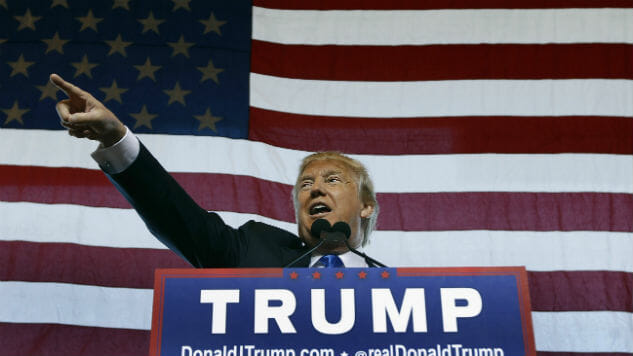Trumpamentalism: The Loudest Minority View
Photo courtesy of Getty
Nigel Farage is a Trumpamentalist—that is to say he’s a Donald Trump supporter who will defend America’s ostensible 45th president to his last breath. Following the implementation of Trump’s controversial Executive Order rohibiting the entry of peoples into America from seven Muslim-majority countries including Syria, Iraq and Yemen, Farage unsurprisingly rallied to Trump’s defense.
In response to the global backlash against the so-called Muslim ban, Farage echoed a common sentiment of the acolytes of Trumpamentalism: he labeled the ban’s opponents “hypocrites.” To Farage and many like-minded Trumpkins, it is hypocritical so many are appalled by the travel ban—of Trump ‘advisor’ Steve Bannon’s design—while saying nothing of the ban in 16 Muslim-majority countries of Israeli citizens, or of the fact President Obama introduced tougher immigration measures singling out Iraqi citizens in his first term.
There are a couple of things wrong with Farage’s argument. First of all, facts are twisted. The Obama administration tightened the vetting procedure for Iraqis in 2011 but no full ban ever actually occurred. Iraqi refugees continued to arrive in America. The Israeli ban Farage speaks of is based not on religion but nationality. Warping his argument to better imply a religiously-motivated order, Farage called it a “Jewish-Israeli” ban. It is Israeli nationals being targeted by the aforementioned countries, owing to the decades of political turmoil between those states; people of the Jewish faith from any other country are still allowed to enter. Compare this to Bannon’s travel ban, which prohibits entry from seven Muslim-majority countries but makes exceptions for Christians.
Secondly: hypocrisy—or rather perceived hypocrisy—does not discount the possibility President Bannon’s Muslim ban might just be racist and dangerous. Obama’s Iraqi ban never actually happened. Even if it had, would it make it OK for Bannon to do the same? That’s not something you’ll find Farage and the Trumpamentalists getting into. Is it conducive to peace and goodwill that those 16 Muslim countries cited by Farage bar Israelis? No. But in this particular debate, what does that matter?
-

-

-

-

-

-

-

-

-

-

-

-

-

-

-

-

-

-

-

-

-

-

-

-

-

-

-

-

-

-

-

-

-

-

-

-

-

-

-

-








































